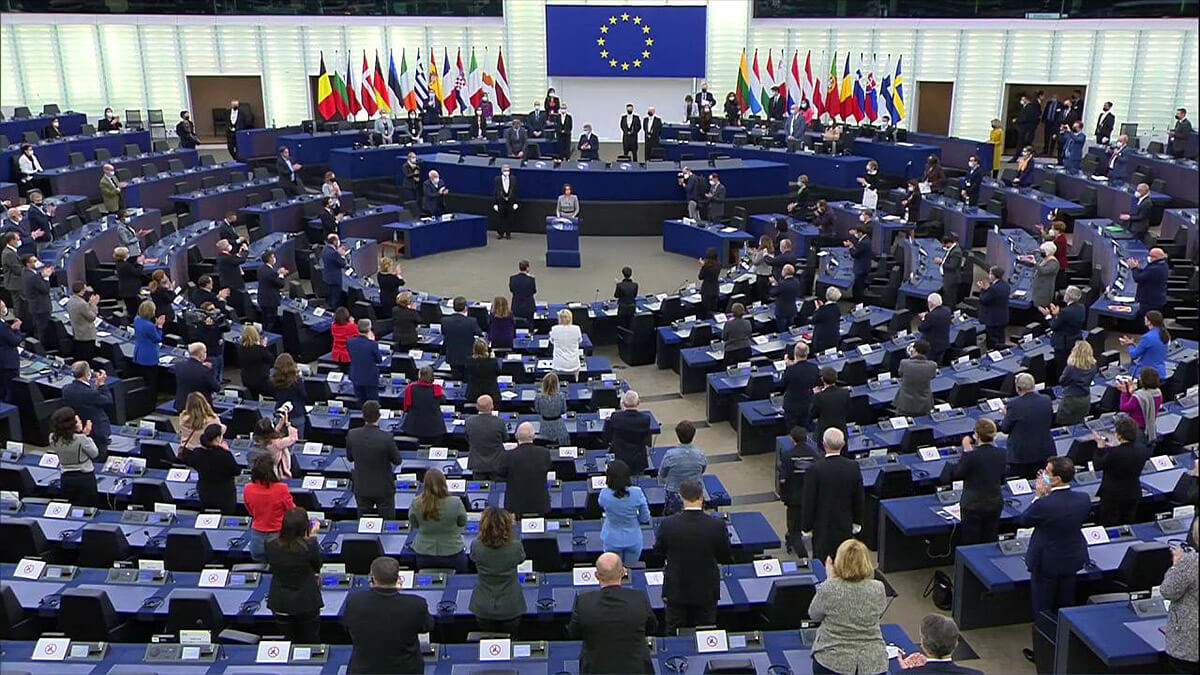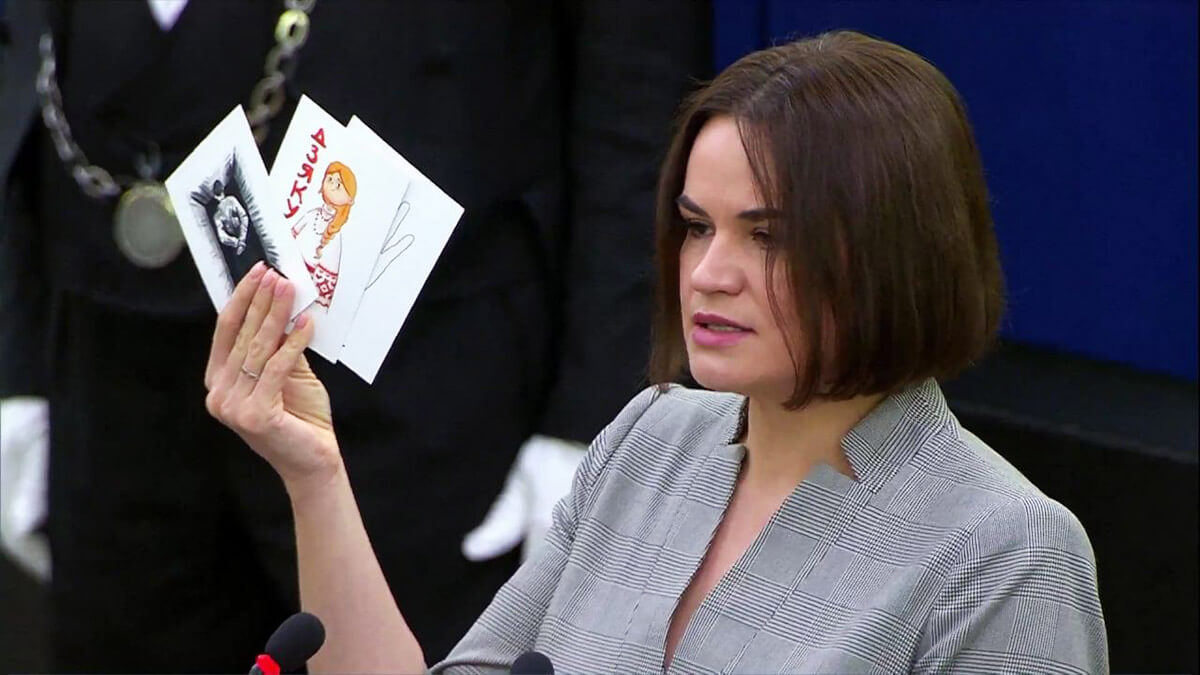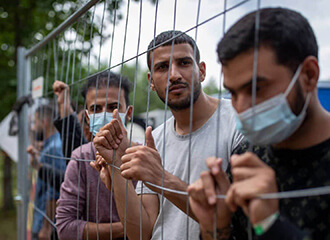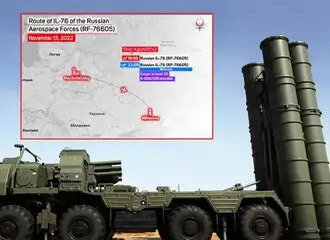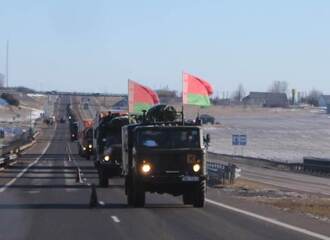На русском языке:
«У нас нет еще одного года». Светлана Тихановская выступила в Европарламенте
На беларускай мове:
«У нас няма яшчэ аднаго года». Святлана Ціханоўская выступіла ў Еўрапарламенце
Today, Sviatlana Tsikhanouskaya, as a representative of Belarus, spoke at the plenary session of the European Parliament with a 30-minute speech. She addressed to European politicians and told what 2021 was like for the Belarusian people, asked EU representatives important questions for Belarusians.
The editors of motolko.help quote the full speech by Sviatlana Tsikhanouskaya.
Mr. President,
Distinguished Members of the European Parliament,
Right now in Belarus, there are more political prisoners than members of this chamber assembled here today. 882 of my fellow citizens have been recognized to be in prison for exercising basic political rights people in the rest of Europe take for granted. If we invited all of the Belarusians unjustly imprisoned for the wrong color of their dress or socks, even four halls like this one would not be enough room.
Screenshot from the video of Sviatlana Tsikhanouskaya's speech
On behalf of them and fellow Belarusians who believe in the freedoms this Union represents, I speak to you today. Among them are my husband, Siarhei, and my friend Maria Kalesnikava. Among them is also Ales Bialiatski. Just one year ago, he was with us at the European Parliament receiving the Sakharov Prize for Freedom of Thought. Ales returned home and half a year later was arrested for his work at the Human Rights Center ‘Viasna’. The case of Ales shows that the Belarusian crisis is much closer to all of us than it might seem. Just recently, Ales was here for all to greet and congratulate. And now he is behind bars. Belarusians are no longer safe in their country and abroad. And neither, in this case, are other Europeans.
As we have seen, the regime in Belarus has shown itself willing to seize individuals from international flights, misuse international agencies and agreements to punish dissent. To weaponize migrants in a way deliberately designed to undermine the stability and security of Europe.
Confronted with this challenge, we can feel paralyzed by fear, or we can take our destiny into our hands and turn the tide of European history in our favor.
When I addressed the European Parliament last December, I spoke about the year 2020. I said then: “This year the world has seen Belarus awakening”. In 2021, the world saw Belarus actively resisting a regime that has only grown more abusive. But has the world seen Europe standing with us in support of our shared values, our freedom, and our dignity?
We saw that Europe can not only talk the talk but also walk the walk.
Belarusians saw brave European diplomats like Dirk Schuebel who were willing to take a risk regarding values and principles. Belarusians were pleasantly surprised by unprecedented action by the European Commission to announce a Comprehensive plan for the future of Belarus. Belarusians were grateful to the European Parliament for the Sakharov Prize and vocal support for political prisoners. But Belarusians also saw the year 2021 in detail. And I would like to briefly explain the way that the year 2021 has been passing for my fellow countryman.
On how a year has passed
In January police in Belarus started arresting dissenting citizens, breaking right into their homes.
In February, two young journalists Daria Tchultsova and Katsiaryna Andreeva were sentenced to two years imprisonment. All they had done was to report on the protest meeting after the terrible death of Raman Bandarenka — after beatings by the security forces. Meanwhile, in Europe, we heard mostly polite urgings to respect freedom of speech in Belarus as analysts speculated that perhaps the political crisis had ended.
In March, hundreds of people were detained simply for being outdoors on Belarusian Independence Day — so much did the regime fear new street protests. Meanwhile in Europe, many said that the situation must have “stabilized” since there were no new pictures of mass protests. Even though 800,000 Belarusians have voted for negotiations via the online platform, Holas.
In April, the regime’s foreign affairs minister promised to «destroy civil society«. People in prisons were poisoned with chlorine. Meanwhile, in Europe, the media interest in Belarus was rapidly vanishing.
May was the critical turning point. The biggest online independent news site TUT.BY was shut down and its team imprisoned. Democratic activist Vitold Ashurak died in prison for unknown reasons. 17-year old Dzmitry Stakhouski couldn’t bear the endless interrogations by the police… He killed himself.
Finally, there was the outrage of the state-sponsored hijacking of a Ryanair plane to kidnap blogger Raman Pratasevich. Only after that did Europe take the first stronger measures against the regime. Nine whole months after the human rights catastrophe in Belarus began.
I am grateful for the EU’s firm response to the regime’s outrageous grounding of a European flight. This was a moment the European Union can truly be proud of. But still, would this have happened if only non-EU citizens were onboard this Ryanair flight? Are democracy and human rights reserved only for EU citizens?
In June, political prisoner Stsiapan Latypau attempted suicide in court because the regime threatened to torture his father if he didn’t plead guilty. Meanwhile, in Europe, politicians were fretting that sanctions might hurt ordinary Belarusians. As if Belarusians were not already suffering. As if they blame the EU. According to surveys most Belarusians blame the regime for existing sanctions, not the EU.
In July, another aspiring presidential candidate Viktar Babaryka was sentenced to 14 years in prison. The same month the regime made good on its promise to “destroy civil society”. It closed dozens of independent media and 270 NGOs and arrested many of their employees and volunteers. Meanwhile, in Europe, we heard expressions of deep concern.
In August, Olympic athlete Krystina Tsimanouskaya was almost kidnapped during the Games in Tokyo simply for criticizing Belarusian sports management. Same time, the IMF signed over 1 billion dollars in COVID support to Belarus. A country where prisoners are being deliberately infected with COVID. Meanwhile, in Europe, the media focus was exclusively on other global issues.
In September, my friend Maria Kalesnikava was sentenced to 11 years in prison. IT worker Andrey Zeltser was shot dead during a KGB raid of his apartment. His wife, as the only witness, was sent to a psychiatric hospital. And nearly 200 Belarusians have been arrested for «negative comments» online about this event. Meanwhile, all over Europe, well-funded lobbyists were working furiously to block new sanctions against this abusive regime.
In October, the migrant crisis exploded to a full scale. At the same time, the 64-year old politician Ryhor Kastusiou remains in prison with suspected cancer. He receives no medical aid. And in Europe, the regime continued using Interpol to pressure the dissidents abroad.
Finally, in November, the tensions at the Belarusian-Polish border reached a boiling point. Thousands of foreign citizens taken hostage by the regime have come to the focus of the EU. Phone calls have been exchanged to alleviate their conditions. But at the same time, nine million Belarusians remain hostages of the regime.
Have we forgotten the tragic lessons of our European past? That tyrants are emboldened by appeasement, not placated. That when you avoid confrontation with a bully, you only make the inevitable showdown that much more costly and dangerous.
But do you really suppose it will stop there? We are already seeing how dangerous a regime like this can be to its neighbors. Lithuania and Poland are facing the biggest test of their border security. By the way, Polska, Lietuva, stay strong! We know that you pay a big price for being true and principled friends to the People of Belarus.
Supposing this abuse of migrants is somehow stopped, do you really believe the regime’s threats beyond its borders will end there? Increases in the flow of smuggled drugs and other contraband? A military provocation? A disaster at a nuclear power plant right on the EU’s external borders? None of this is just my imagination. These are threats that the regime itself has made. Whatever it takes to get what it wants.
On time for Belarusians
Meanwhile Europe hesitates, time goes by for those unjustly imprisoned, killed, or exiled. Time is measured differently for Belarusians. It’s measured in lost moments of happiness — moments that are the right of every one of us to experience. Moments that are the reason why all of us want to live in freedom and dignity.
Moments that Belarusians are deprived of.
For me, those would be moments when my daughter Agnia might see the loving face of her father Siarhei seeing her off on her first day of school. Moments when my son Karnei could feel the support of a father who helps him to fix his bicycle.
For other mothers like Dasha Losik, Volha Zalatar, Alena Bondarenka, time is measured in tears. When you don’t know if your husband is still alive. When you’re behind bars and you have no news about your 5 kids. When all is left of your child is a framed photograph with a black ribbon. Because they beat him to death when he asked them not to remove the white-red-white ribbons hung in his backyard.
For the workers in MTZ, Belkalii, Hrodna Azot, time is measured in sweat spilled while forced by the regime to work in unbearable and dangerous conditions. Conditions that are close to being slavery…Work with no rights.
For thousands of activists across the country, time is measured in units of stress and anxiety. Because even though they choose “safer” methods of resistance like distributing self-published newspapers, pasting stickers, joining independent labor movements, every day they risk arrest.
And for our medics from Voranava to Hotimsk, from Verhnedvinsk to Bragin, time is measured in hours of overtime and the minutes of sleep they are allowed. Because, due to the regime’s disregard of the pandemic, their workload has tripled.
Ladies and Gentlemen, do you think these people understand what we mean when we talk about the EU’s long bureaucratic processes and complex diplomacy? Do you think our statements of deep concern give them hope and confidence?
What can the European Union really say to the people of Belarus — to the forgotten Europeans — who want the same things the rest of Europe enjoys? Perhaps we have no right to demand your help or support. Perhaps you may refuse us because it may contradict your national interest. Or perhaps it’s bad for your businesses.
But I am here to ask for your support, nevertheless. Our fight for freedom is your fight for freedom too. Only by standing together and acting decisively, does democracy have the chance to survive in this world.
On need for firm action
Distinguished Representatives of Europe, pardon my straightforwardness, but I must say it: It is getting late! Since August 2020, there have been ample gestures and expressions of solidarity. Belarusians were praised for reigniting their faith in democracy and human dignity. Is it not the turn for Europeans to demonstrate their commitment to those values with action? Will Europe as a whole have the courage to take decisive action now? Or will we wait another year?
Dear ladies and gentlemen, we don’t have another year. Neither does Belarus. Neither does Europe.
There is more we can do than just wait and react. The regime in Minsk is motivated by fear of the Belarusian people. Hence, the escalation of violence. Meanwhile, Belarusians are not giving up. Three independent surveys show more than half of Belarusians want a new presidential election. Despite intense political pressure, Belarusians are still finding ways to protest. Maybe not in ways that get the attention of your media. But thousands have joined mobilization initiatives like «Victory plan» and «The Workers’ Movement». They are coordinating and preparing for new rallies and strikes when they are possible. Independent media and civil society groups have reorganized abroad and continue to work for Belarus. I am proud of each of the brave Belarusians in our country and in our diaspora. It is they who will change our country for the better. New Belarus is not only about the future. It is already being born and growing. But today it needs your help.
We need Europe to be more proactive when facing autocracy. The cliché about Belarus being «the last dictatorship of Europe» is, in a way, misleading. Dictatorship does not have natural geographical limits. It spreads if it is not stopped. Dictatorships, after all, can be compared to a virus infecting the body. We all know that the more disease is ignored, the more difficult it is to treat it in the future. It’s now clear to the whole world that waiting and seeing is not the right strategy to address the virus. Action is crucial.
A three-part strategy
To successfully overcome a virus a three-part strategy can help. First, isolation to prevent its spread. Second, treatment to remove its negative effects. And last but not least, the immunity which allows keeping the body in good shape. The same strategies can be applied by Europe when dealing with the virus of dictatorship in Belarus.
The first part of our strategy should be the isolation and non-recognition of the regime. Many Belarusians are hurt to see that even today such influential European media — from Deutsche Welle to BBC — call Aliaksandr Lukashenka «president». He is not. It shapes the wrong perception among millions of viewers. He is a citizen of Belarus who has illegally usurped presidential power by violenсe.
Europe, let’s stand up to your decisions! You did not recognize the elections, so do not call this impostor for what he isn’t. Do not recognize any deals made without Belarusians’ agreement. Speak clear and loud: the contracts signed by the regime after 9 August 2020 are and will be legally void. Lukashenka is gambling with Belarus’ sovereignty. We must stay firm in non-recognition policy and be clear that independence and sovereignty can not be traded or undermined.
This non-recognition should be coherent. New ambassadors to Belarus should not be appointed, nor should anyone who respects freedom, human rights, and the rule of law receive the regime’s ambassadors. We also should not invite its representatives to international gatherings, sports, or cultural events. Suspend the regime’s membership in Interpol. This would send a signal that abuses will no longer be tolerated. Instead, I encourage you to give a voice to the Belarusian people. Invite Belarusian democratic forces to all international fora to represent them at the highest level, particularly during the Eastern Partnership Summit.
The second part of our strategy is treatment. We should push back on the regime and limit its access to the resources it uses to maintain power. When your child is ill, you know you have to give him medicine even if it hurts to see him resisting. But you realize this is the only way. The same principle should apply when we talk about European sanctions against the regime. Let me assure you: sanctions do work. Continue holding a consistent sanction policy. Sanctions split the elites, destroy corruption schemes, and divide people around Lukashenka. As no one wants to share the responsibilities for the regime’s crimes. Let us be firm. We must not let lobbyists block the necessary sanctions. Let’s close all remaining loopholes. Let’s coordinate our actions with the US and the UK to make the sanctions effective and not merely symbolic.
By all means, let us be consistent. It makes little sense to further invest in the mafia regime. Send a message that we will not enrich it so that it can use these resources to abuse its citizens.
Let us be true to international law! Give the green light to prosecute the human rights offenders under the universal criminal jurisdiction. Invoke the regime’s responsibility for capturing the civilian aircraft and its hybrid attack on the EU borders! Let’s make sure all the evidence of the regime’s crimes will lay on the table of the international tribunal. At ICC and ICJ. I call on Europe to take the initiative in that.
The third part of our strategy is immunity. We need to boost the natural resistance and backbone of Belarusian society. I call on Europe to expand assistance to our people. It requires flexibility and a non-conventional approach to reach those on the ground. To human rights defenders, media, citizen journalists and journalists-investigators, local neighborhoods, activists, volunteers, initiatives promoting Belarusian language and culture. Programs of rehabilitation for families of the repressed, and programs of psychological aid. People must feel they are not abandoned.
On solidarity
Let us stand together in solidarity! Let’s not forget the Belarusian prisoners of conscience and their families. Do not let the regime manipulate the migrants smuggling in order to obscure the human rights catastrophe inside the country. Both Belarusians and migrants are now hostages of the regime. And these two problems cannot be solved separately. Remember, to cure the virus we need to treat the problem at its root, not just the symptoms.
And let us all be true to our principles. Let’s help those who were forced to leave the country. Many Belarusians fled in a hurry, with short-term Schengen visas. Many Belarusians don’t like to be considered as immigrants but as temporary relocants. They want to get back home soon, but they need small things like legal stay and work permits. Though we usually speak of democracy in high terms, democracy is made of small details too.
Help Belarusians so they can help Belarus and Europe, too. So we could continue the fight for our freedom and yours. I know that I’m surrounded here by allies and partners like President Sassoli, Vice-President Metsola.
To all group members “Friends of democratic Belarus” who took godparenthood for dozens of political prisoners in Belarus. Who sent them letters and postcards. Today I brought a response from them to you — “Freedom Postcards” — drawings made by political prisoners in their letters. They feel your support, my dear friends. So as millions of Belarusians who are sincerely grateful to you and all the members of the European Parliament for your firm position, for your statements and resolutions. But they also want the words to be materialized in actions. People on the ground in Belarus have huge expectations from you for one simple reason. They want to see in Europe an example to be followed.
Screenshot from the video of Sviatlana Tsikhanouskaya's speech
So finally. Let us be true to Europe. The dream of a united Europe is not a dream about a bureaucratic system or an economic union alone. It is the dream of sisterhood and brotherhood. Of a community of nations and people that cooperate peacefully and respectfully, in freedom and dignity. It is a dream that our shared values of respect for human rights, of representative, constitutional government, and the rule of law. Being a community means walking a common path together. Last year, when we met I said about Belarus: “Every country has its own path to democracy, and this is ours”. Now, one year later, Belarusians are much closer to their goal. But the road has become much more difficult. Obstacles are constantly being thrown in our path.
Today not only democracy in Belarus but also democracy in Europe depends on whether we will walk this path together. And overcome these obstacles together. It is time to show that European values are and will continue to be our greatest source of strength and the only solid foundation for peace and prosperity.
I am here today to invite you to walk that path with us.
Thank you very much! Жыве Беларусь! Жыве Еўропа! Long live Belarus and long live Europe!
